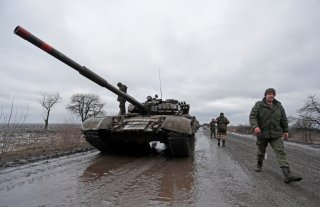Russian Troops Reportedly Begin Withdrawing from Chernobyl Area
A U.S. official said that the forces are being repositioned into Belarus.
Russian troops have allegedly begun a withdrawal from the defunct Chernobyl nuclear power plant in northern Ukraine, roughly one day after the Russian government indicated that it would withdraw from positions in the country’s north to focus its efforts on eastern Ukraine.
An anonymous U.S. official told the AFP news agency that troops stationed in the vicinity of the Chernobyl reactor were being repositioned into Belarus, a short distance to the north.
“We think that they are leaving,” the official said. “I can’t tell you that they’re all gone.”
Russian troops launched an attack against the Chernobyl area in the opening hours of the invasion on February 24. An intense battle was held around the site, raising concerns that a stray artillery shell or explosion could damage the concrete sarcophagus containing radioactive debris from the reactor’s infamous meltdown in 1986. Russian forces ultimately captured the reactor without incident, although they held Ukrainian workers at the plant hostage for roughly three weeks.
Two weeks later, Russian troops captured a second Ukrainian nuclear facility, an active power plant near the city of Zaporizhzhia. Fighting in the area started a fire at the facility, although it was ultimately contained without incident.
The Chernobyl disaster is widely considered the worst disaster in the history of nuclear power. Around thirty Soviet citizens died during and soon after the accident, and later estimates suggested that hundreds or thousands had shortened lives as a result of radiation exposure during the cleanup. Soviet authorities created an “exclusion zone” in southern Ukraine and northern Belarus in which permanent human settlements were removed in order to prevent radiological contamination.
During the invasion, Russian troops without radiation protection reportedly drove through the “Red Forest,” one of the most toxic areas of the exclusion zone. A Chernobyl employee later described the Russian military’s decision to send vehicles through the area as “suicidal” because of their tendency to kick up large amounts of radioactive dust, which is relatively safe on the ground but extremely dangerous in the lungs.
Ukrainian journalist Victor Kovalenko later claimed that several busloads of Russian soldiers who had been stationed in the exclusion zone were evacuated to hospitals in Belarus after suffering symptoms of radiation poisoning.
In addition to the Chernobyl site, Ukraine has four active nuclear power plants, including the Zaporizhzhia facility, which is currently in Russian hands.
Trevor Filseth is a current and foreign affairs writer for the National Interest.
Image: Reuters.

